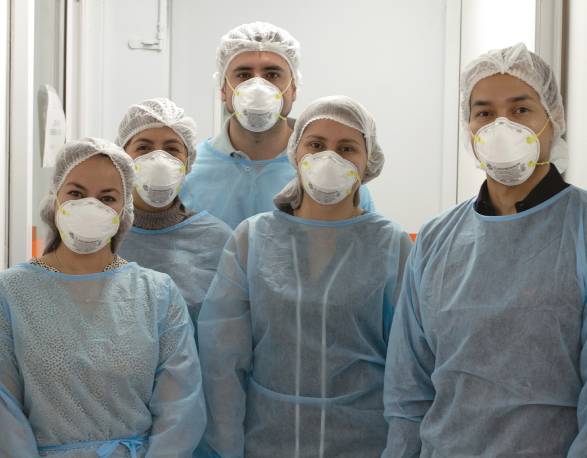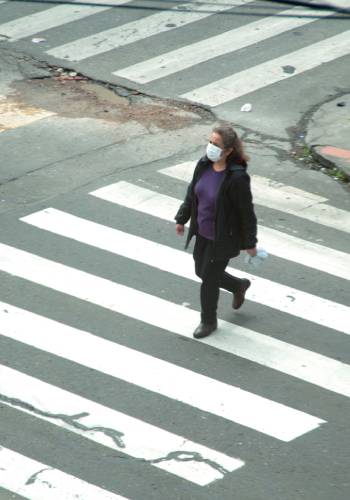Humanity on trial
By: Ángela Constanza Jerez y Ninfa Esperanza Sandoval
Photos:
Health and Wellness

By: Ángela Constanza Jerez y Ninfa Esperanza Sandoval
Photos:
COVID-19 showed the capacity of institutional response
COVID-19 put humanity on trial. Like never before, professionals and the health system have had to work to their full capacity to assist patients, seek new treatments, and develop a vaccine. Other professionals have also contributed their knowledge and time to respond to the effects of the health, social, and economic emergency. The Universidad del Rosario could contribute to Colombia, in this context, on every point, and this has been possible thanks to its commitment to research.¡The university had the capacity!
The Universidad del Rosario has been in the spotlight throughout the year in relation to the good activities undertaken in Colombia as regards the COVID-19 pandemic.
To begin with, the Microbiology Laboratory was authorized to perform the first molecular diagnosis tests of the disease. Then, the Centro de Estudios de Enfermedades Autoinmunes, CREA (Center for Autoimmune Diseases Research) that, together with other institutions, obtained the approval of the Instituto Nacional de Vigilancia de Medicamentos y Alimentos, Invima (National Institute of Drug and Food Surveillance) for the first clinical trial of convalescent plasma in COVID-19 patients. And a few days later, among other good news from the Universidad del Rosario, the project CoronaMonitor was disclosed, with the participation of the Faculty of Economics. Its mission is to obtain information in real time about people’s health and socioeconomic conditions to help the authorities in their decision-making.
“Although all this has been really difficult, we can say that good things have happened, such as proving that we were sufficiently prepared. For example, we had made significant investments in equipment and spaces; we had trained and hired professors of international standing, including researchers; and we had mapped processes that showed us what to do, which are the routes, and who are responsible for it. All this was essential to immediately react to the different needs that have arisen in the country”, says María Martínez Agüero, the former vice provost of Research and Innovation at the Universidad del Rosario.
Therefore, in her opinion, the greatest lesson learned during these months is that investing in research is definitely an investment and not an expense. “We do not know when that investment will pay off. It may be fast, or it may take years, but it will always be justified,”, she adds.

Apart from being prepared with a vigorous research ecosystem, María Martínez reckons that the Universidad del Rosario demonstrated that other areas were also ready to face an emergency such as the current one. This is because each process that needed to be carried out throughout 2020 to respond to the impacts of the pandemic has required the knowledge and commitment of teams other than the scientific team. For example, the mere execution of an agreement with the Colombian National Government requires the articulation of multiple internal parties: Academic institutions, the Legal Department, Financial Direction Office, Research and Innovation Office, and Purchasing, among others. Consequently, had they not had several years of practice improving the processes and protocols, they would not have been able to respond in time.
“ll this shows a very committed human capital and a robust institution that backs it up so that the work can be done. Moments of crisis are always strategic to show strengths, and they have shone”, she claims.
The Dean of the School of Medicine and Health Sciences, Gustavo A. Quintero Hernández, adds that the current emergency also evidences how well-prepared they are to think“outside the box”. That has allowed them to promptly respond to the daily challenges faced by the different teams because the healthcare area is not the only one that is working to meet the demands posed by the current situation.
Precisely, for Martínez, having a broader vision of the pandemic is another clear example of the institutional commitment of the Universidad del Rosario. Unlike public opinion, which has focused on finding treatments and vaccines against the virus, the researchers of the university have targeted different fronts to address not only immediate issues but also those that are yet to come.
“Healthcare professionals from the Faculty of Sciences, School of Medicine, as well as from hospitals with which we have an agreement, such as Méderi (one of the Colombian Healthcare institutions with the largest number of intensive care unit beds), have been directly addressing all health problems, but since it is a matter of human population, there are other situations that require the intervention of Economics and Human Science professors and others in fields that are asking research questions”, she explains.
Indeed, researchers from different schools of the Universidad del Rosario have created projects; they have joined other projects; they have given a turn to those projects wherein they were working; or they have finished them in advance to address situations other than those strictly related to COVID-19 treatment or the quest for a vaccine.
This is the case of the laboratory method carried out at the School of Human Sciences, the purpose of which has been, since April, to solve the concerns arising from the pandemic in the cultural sector. Similarly, the Generations that Connect project, also conducted by the School of Human Sciences, aims at helping the elderly to develop digital skills so they feel useful instead of isolated. The project was in its first stage and was suddenly moved on to the next stage to promptly develop such skills in the elderly population, whose mobility has been restricted like no other because of the pandemic.
“Remote working, social distancing, isolation, unemployment, and other situations that we are going through as a human population are worth being analyzed, and it is wonderful to see our researchers do so. Questions are being asked, national and international networks are being created or strengthened, agreements are being executed, and partners are being sought out to face the other side of a reality that nobody had ever experienced before,”, adds María Martínez.
The Dean of the School of Medicine and Health Sciences highlights that collective work component. In his opinion, one of the biggest lessons learned through this pandemic is the capacity that the university has based in its longstanding reputation to call and convene others in order to achieve solidarity in the country.
“There’s never been a collaborative work opportunity in Colombia like the one we have nowadays. All our projects have huge national and international collaboration. Perhaps without even intending to do so, I think we have made open science possible, which was something merely theoretical. We need to share research, works, our results, and publications. COVID-19 has allowed us to open science to the world instead of working in isolation behind the walls of the university”, she highlights.
These initiatives, as well as those directly related to the healthcare area, are included in this special report. All of them render account for collective work carried out by professionals from different areas who work untiringly, without having time for themselves or their families. Professionals are committed to the point of risking their own lives.
“An adverse time like the one we are going through nowadays requires everyone’s work. It also requires us to understand that this is also an environmental issue. Climate change does exist; deforestation is everyone’s problem, zoonosis is real (an animal disease that can be transmitted to humans). Research and state policies are needed to support this”, concludes Martínez, professor at the Faculty of Natural Sciences and Ph.D. in Population Genetics and Evolutionary Biology.